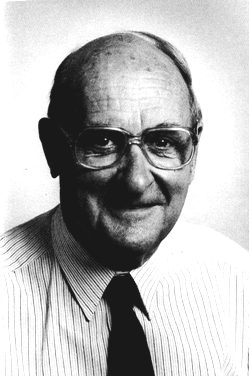
Perce Allen was without doubt one of the leading international figures in the development of sedimentology. He had a long and distinguished career (still contributing to research at the age of 91) and in 1959 he published a prophetic paper emphasising that the best bet for the oil industry would be in the North Sea, and advocated a programme of exploration there.
Allen took his BSc at Reading in 1939, and went on to a PhD (1943) on the Cretaceous sediments of the Weald District in his beloved Sussex. His PhD was Reading's first to be awarded in geology, and was written largely on the train between his RAF station (where he worked during the war in the Photographic Interpretation Unit) and the Weald. In 1946 he went to a lectureship at Cambridge, and in 1952 was appointed as Professor and Head of Department at Reading. He was to spend the rest of his academic career at Reading, and became an Emeritus Professor on his retirement in 1982. He was awarded an honorary DSc in 1992.
Wealden rock formations of south-east England remained a passion for Allen, not least the sandstone beds at Philpots Quarry, West Hoathly, West Sussex, that would keep him occupied in the field and laboratory for many years. Arguably, his most influential paper was published in 1975, overturning his earlier interpretation of the ancient Weald with a revised model, that stands as a benchmark today after three decades of further investigation.
Perhaps Allen's most important geological achievement at Reading was probably the foundation of the Sedimentology Research Laboratory (SRL) in 1962. He worked tirelessly to raise funds for this groundbreaking institution, largely from the oil industry. In 1982 another new geology building at Reading was named the Allen Laboratory.
He founded the British Sedimentological Research Group, which, and proposed the formation of the International Association of Sedimentologists at the International Geological Congress (IGC) in 1948. He was also a member of the Natural Environment Research Council and founded tthe Association of European Geological Societies.
The 7th International Sedimentological Congress was held in Reading and Edinburgh in 1967 under Allen's leadership and was a huge success.
Allen would go to endless trouble to help students and colleagues with either professional or personal problems; one always left his office feeling better than when one went in. He also demonstrated his allegiances and sense of priorities when in 1959 he collaborated the rag students in the announcement that diamonds had been found in the gravels of the Thames Valley. For this he achieved considerable notoriety and attracted the wrath of certain members of the academic establishment as well as the Times newspaper.
Allen served as President of the Geological Society from 1978 to 1980 (and received the Lyell Medal in 1971), and was elected to Fellowship of the Royal Society in 1973, and was a Vice-President from 1977-79. He held honorary membership of the Society of Economic Palaeontologists and Mineralogists, the International Association of Sedimentologists, and the Geologists' Association. Most recently, the Association of European Geological Societies (AEGS) instituted the Percival Allen Medal for promoting international relations between geoscientists, which was awarded for the first time in 2007.
Andrew Parker